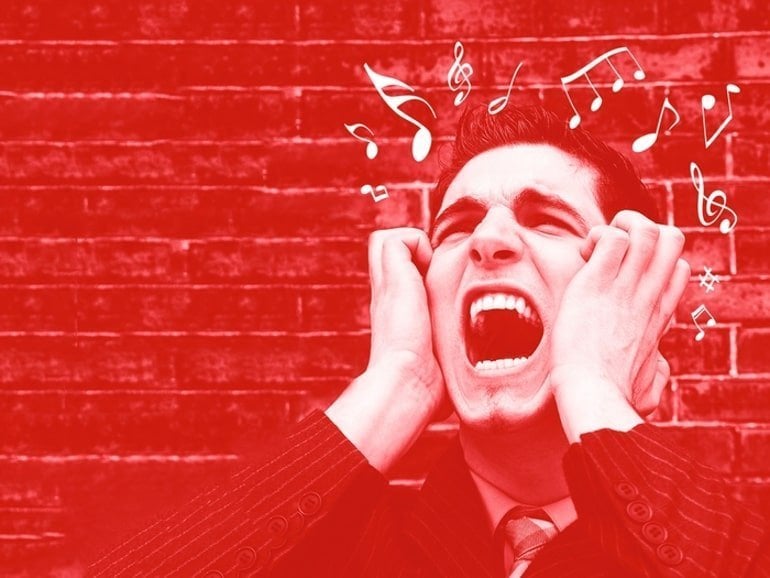Summary: A new study explores music aversion, finding musical dislike may facilitate identity expression and help demarcate social groups.
Source: Max Planck Institute
So, a metal head shows up at a techno party… pretty unlikely, right? Right. Disliking certain kinds of music is just as constitutive of personal taste as is liking other kinds; and because it influences music-related behavior, this has consequences for our everyday lives.
Researchers at the Max Planck Institute for Empirical Aesthetics (MPIEA) in Frankfurt am Main, Germany, have now investigated some of the possible reasons why people dislike music.
Their study has just appeared in the journal PLOS ONE.
With very few exceptions, previous research on musical taste has focused on preferences for certain kinds of music. Now, for the first time, a team of scientists has explicitly investigated musical aversion. In extensive interviews with 21 participants representing five age groups, they discovered the specific reasons for their individual dislikes.
“The most often mentioned type of dislike was musical style, followed by artist and genre,” explains senior author Julia Merrill. “When we looked more closely at the participants’ rationales, we were able to identify five main reference points for describing musical dislikes: the music itself, lyrics, performance, artist, and the people who listen to it.”
The researchers assigned these rationales to three categories: first, object-related reasons, such as music composition or lyrics; second, subject-related reasons, such as emotional or bodily effects or discrepancies with self-image; and third, social reasons, which pertain to an individual’s social environment and taste judgments common to it (in-group) or to other groups to which an individual does not feel part of (out-group).

Apart from the reasons for disliking music, participants described specific reactions they have when confronted with music they dislike. These included emotional, bodily, and social reactions, ranging from leaving the room to breaking off social contact.
While earlier research has shown that musical aversion has important social functions, this study expands the range of rationales to include music-related and personal reasons. Musical dislikes may, for instance, serve to maintain a good mood, facilitate identity expression, or help demarcate a social group. In this way, they fulfill similar functions as musical preferences, but are expressed less openly and more indirectly.
About this music and neuroscience research news
Author: Ina Wittmann
Source: Max Planck Institute
Contact: Ina Wittmann – Max Planck Institute
Image: The image is credited to MPI for Empirical Aesthetics
Original Research: Open access.
“Rationales and functions of disliked music: An in-depth interview study” by Julia Merrill et al. PLOS ONE
Abstract
Rationales and functions of disliked music: An in-depth interview study
Background and objectives
With a few exceptions, musical taste has been researched via likes or preferences of certain types of music. The present study focuses on disliked music and takes a broad approach to cover explanatory strategies related to personal dislikes.
Methods
In-depth interviews were conducted with 21 participants in five age groups. Interviewees were asked to prepare a list of their disliked music, and for each item they were asked about the reasons for the dislike. To ensure that the complexity and range of the participants’ dislikes and rationales were captured in the analysis, a structuring content analysis as a mostly theory-driven approach was combined with inductive category creation out of the interview data.
Results
The most often mentioned type of dislike was musical style, followed by artist and genre. Five main reference points were identified for describing musical dislikes: the music itself, lyrics, performance, artist, and the people who listen to it. The identified rationales for disliked music were assigned to three larger categories: object-related reasons, such as music-compositional aspects, aesthetic dichotomies or lyrics; subject-related reasons, such as emotional or bodily effects, or discrepancies with the self-image; social reasons, which refer to one’s social environment and the taste judgments common to it (in-group) or to other groups of which the participants do not feel part of (out-group). Apart from the rationales for disliked music, the participants described specific reactions when they are confronted with their disliked music, such as emotional, physical, and social reactions.
Conclusions
While musical dislikes have already been shown to fulfill important social functions, the current study extends the rationales to music-related and self-related reasons. Musical dislikes fulfill similar functions to liked music, such as preservation of a good mood, identity expression and construction, strengthening of group cohesion as well as social distinction.







